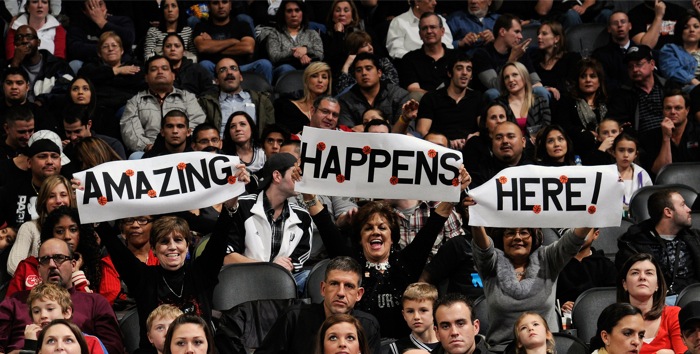
We’ve all done it. Whether we want to admit it or not, we’ve all become bandwagoners of a team at some point of our sports life. UrbanDictionary poetically defines a ‘bandwagoner’ as “someone who shamelessly cheers for a particular team not because he likes them or follows them faithfully, but only because that particular team is the “popular” choice or has been or is the top team in their specific sport recently. When that team which bandwagoners follow falls from grace, they gleefully jump on the next teams bandwagon and cheer for that team.”
While bandwagoners add to the momentum of a fan base, on the other end of the spectrum, we have those that started it: loyal fans. In sports, these are the individuals who are willing to stand by a team through the highs and lows. During the good times and the bad, these fans are always there to show their support for their team.
While it’s hard to say what the true value of one fan is to a sports team, we can start at the obvious which is invaluable. What separates loyal fans from everyone else isn’t the number of years they have rooted for a team or the number of games they have watched. Rather, it’s the simple fact that they consider the team they support their team. In what could be considered a sort of pseudo-family, teams and loyal fans share success as well as failure. There is no “they” when in reference to a sports team, there is only “we.”
Why Sports Teams Need Loyal Fans
Aside from the obvious reason of selling tickets, loyal fans help make up the brand of a sports team. From Raider Nation in Oakland to Clipper Nation in Los Angeles, these loyal fans not only support their teams on game day, but they extend the reach and personify the brand that their teams represent. From the fan that wears the silver and black while walking with friends to the fan that wears Dodger Blue to school, loyal fans help spread and extend their sports teams reach.
Teams Are Rewarding Loyal Fans
In the past, the relationship between a loyal fan and their favorite sports team was essentially non-existent. Yes, fans could get a picture with their favorite player (if lucky) and pay to watch them in person, but for the most part, loyal fans stood by with little notice. Thanks to the social media and the increasing presence of sports teams in the digital space, loyal fans are ‘closer‘ to their teams than ever before. From exclusive team content geared toward official fan communities to official tweet-ups hosted by sports teams, the wall between the fan and the team has come down. Sports team are slowly, but surely, starting to realize that loyal fans are an integral part of their success and that it’s time to start rewarding them for their support.
—-
To close, I leave you with a story I came across regarding a die-hard hockey fan:
A woman had tickets to Game 7 of the Stanley Cup Finals right at center ice. As she sits down, a man comes down and asks if anyone is sitting in the seat next to her.
“No,” she says, “the seat is empty.”
“This is incredible” said the man. “Who in their right mind would have a seat like this for the Stanley Cup and not use it?”
She says “Well, actually, the seat belongs to me. I was supposed to come with my husband, but he passed away. This is the first Stanley Cup we haven’t been to together since we got married in 1967.”
“Oh…I’m sorry to hear that. That’s terrible. But couldn’t you find someone else – a friend or relative, or even a neighbor to take the seat?”
The woman shook her head. “No. They’re all at the funeral.”
###


I think one of the most important aspects of cultivating and growing loyal and passionate fans is the influence they have on others. If a team does right by 20 of their most passionate fans, it’s likely they’ll attempt to influence 5 of their friends, with that outreach ultimately reaching upwards of 100 people.
The last graph touches on what many sports teams should be doing—remembering to market to the fans you already have. One-off promotions may bring fans to the ballpark or arena for their bobbleheads but bringing in your most passionate fans and conveying to them that they’re truly part of the organization will foster that relationship to the point that they invest in the team, through season tickets, merchandise, or otherwise. Truly successful franchises aren’t measured by single season attendance numbers, but by number of passionate fans they carry with them from year to year.
And it was only proper that you showed the fans of my beloved hometown San Antonio Spurs, where team loyalty is the blood of nearly every citizen of that city.
Spurs players are always at Taco Cabana giving our free autographs, showing up to schools for read books to children, or showing up to Youth Basketball league games to help coach or instruct. It’s been that way since I can remember as a kid growing up in SA and I fully believe that idea of giving back has manifested itself for success in various other aspects of the organization.
I really agree with this blog, loyal fans are those who can do anything for their ideal.